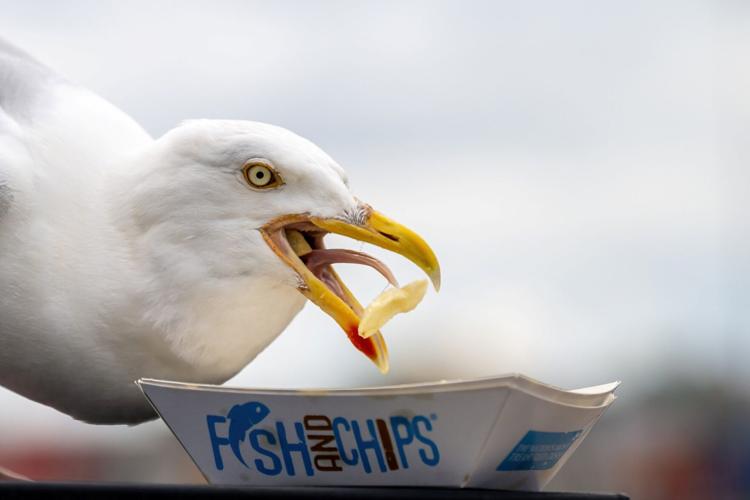
(James Linsell-Clark via SWNS)
By Tom Bevan
Researchers say shouting at seagulls makes them more likely to leave your food alone.
Research carried out showed physical violence was not needed to scare off gulls, but a loud ticking off could be enough to save your food from the pesky swoopers.
Researchers used male voices - as most crimes against wildlife are carried out by men - and a put a closed Tupperware box of chips on the ground to pique the herring gulls’ interest.
Once a gull approached, the team from the University of Exeter played either a recording of a male voice shouting or speaking the words, “No, stay away, that’s my food” or the ‘neutral’ birdsong of a robin.
They tested a total of 61 gulls across nine seaside towns in Cornwall and found that nearly half of those gulls exposed to the shouting voice flew away within a minute.
Only 15 percent of the gulls exposed to the speaking male voice flew away, while the rest walked away from the food, still sensing danger.

(James Linsell-Clark via SWNS)
In contrast, 70 percent of gulls exposed to the robin song stayed near the food for the duration of the experiment.
Dr. Neeltje Boogert of the Centre for Ecology and Conservation at Exeter’s Penryn Campus in Cornwall, said: “We found that urban gulls were more vigilant and pecked less at the food container when we played them a male voice, whether it was speaking or shouting.
“But the difference was that the gulls were more likely to fly away at the shouting and more likely to walk away at the speaking.
“So when trying to scare off a gull that’s trying to steal your food, talking might stop them in their tracks but shouting is more effective at making them fly away.”
The recordings, in which five male volunteers recorded themselves uttering the same phrase in a calm speaking voice and, separately, in a shouting voice, were adjusted to be at the same volume, which suggests gulls can detect differences in the acoustic properties of human voices.

(Katielee Arrowsmith via SWNS)
Dr. Boogert explained: “Normally, when someone is shouting, it's scary because it's a loud noise, but in this case, all the noises were the same volume, and it was just the way the words were being said that was different.
“So it seems that gulls pay attention to the way we say things, which we don’t think has been seen before in any wild species, only in those domesticated species that have been bred around humans for generations, such as dogs, pigs and horses.”
They added: “Most gulls aren’t bold enough to steal food from a person, I think they’ve become quite vilified,” said Dr Boogert.
“What we don't want is people injuring them.
"They are a species of conservation concern, and this experiment shows there are peaceful ways to deter them that don't involve physical contact.”
The RSPCA has stated that seagulls are considered a species of conservation concern in the UK because there is evidence suggesting that their populations are in decline overall.

























(0) comments
Welcome to the discussion.
Log In
Keep it Clean. Please avoid obscene, vulgar, lewd, racist or sexually-oriented language.
PLEASE TURN OFF YOUR CAPS LOCK.
Don't Threaten. Threats of harming another person will not be tolerated.
Be Truthful. Don't knowingly lie about anyone or anything.
Be Nice. No racism, sexism or any sort of -ism that is degrading to another person.
Be Proactive. Use the 'Report' link on each comment to let us know of abusive posts.
Share with Us. We'd love to hear eyewitness accounts, the history behind an article.